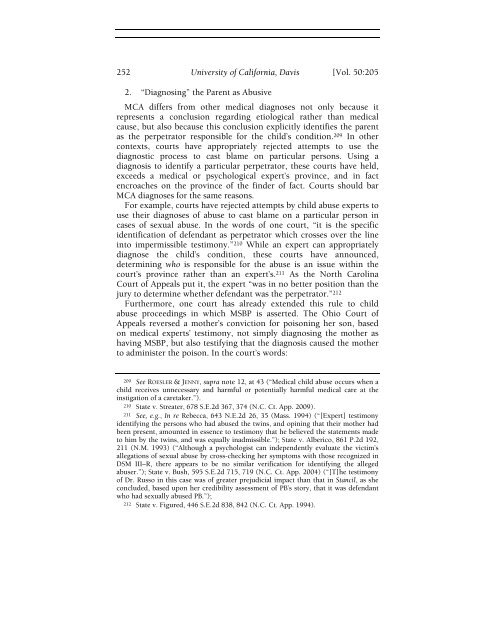Bad Medicine Parents the State and the Charge of “Medical Child Abuse”
URLsZzFO
URLsZzFO
You also want an ePaper? Increase the reach of your titles
YUMPU automatically turns print PDFs into web optimized ePapers that Google loves.
252 University <strong>of</strong> California, Davis [Vol. 50:205<br />
2. “Diagnosing” <strong>the</strong> Parent as Abusive<br />
MCA differs from o<strong>the</strong>r medical diagnoses not only because it<br />
represents a conclusion regarding etiological ra<strong>the</strong>r than medical<br />
cause, but also because this conclusion explicitly identifies <strong>the</strong> parent<br />
as <strong>the</strong> perpetrator responsible for <strong>the</strong> child’s condition. 209 In o<strong>the</strong>r<br />
contexts, courts have appropriately rejected attempts to use <strong>the</strong><br />
diagnostic process to cast blame on particular persons. Using a<br />
diagnosis to identify a particular perpetrator, <strong>the</strong>se courts have held,<br />
exceeds a medical or psychological expert’s province, <strong>and</strong> in fact<br />
encroaches on <strong>the</strong> province <strong>of</strong> <strong>the</strong> finder <strong>of</strong> fact. Courts should bar<br />
MCA diagnoses for <strong>the</strong> same reasons.<br />
For example, courts have rejected attempts by child abuse experts to<br />
use <strong>the</strong>ir diagnoses <strong>of</strong> abuse to cast blame on a particular person in<br />
cases <strong>of</strong> sexual abuse. In <strong>the</strong> words <strong>of</strong> one court, “it is <strong>the</strong> specific<br />
identification <strong>of</strong> defendant as perpetrator which crosses over <strong>the</strong> line<br />
into impermissible testimony.” 210 While an expert can appropriately<br />
diagnose <strong>the</strong> child’s condition, <strong>the</strong>se courts have announced,<br />
determining who is responsible for <strong>the</strong> abuse is an issue within <strong>the</strong><br />
court’s province ra<strong>the</strong>r than an expert’s. 211 As <strong>the</strong> North Carolina<br />
Court <strong>of</strong> Appeals put it, <strong>the</strong> expert “was in no better position than <strong>the</strong><br />
jury to determine whe<strong>the</strong>r defendant was <strong>the</strong> perpetrator.” 212<br />
Fur<strong>the</strong>rmore, one court has already extended this rule to child<br />
abuse proceedings in which MSBP is asserted. The Ohio Court <strong>of</strong><br />
Appeals reversed a mo<strong>the</strong>r’s conviction for poisoning her son, based<br />
on medical experts’ testimony, not simply diagnosing <strong>the</strong> mo<strong>the</strong>r as<br />
having MSBP, but also testifying that <strong>the</strong> diagnosis caused <strong>the</strong> mo<strong>the</strong>r<br />
to administer <strong>the</strong> poison. In <strong>the</strong> court’s words:<br />
209 See ROESLER & JENNY, supra note 12, at 43 (<strong>“Medical</strong> child abuse occurs when a<br />
child receives unnecessary <strong>and</strong> harmful or potentially harmful medical care at <strong>the</strong><br />
instigation <strong>of</strong> a caretaker.”).<br />
210 <strong>State</strong> v. Streater, 678 S.E.2d 367, 374 (N.C. Ct. App. 2009).<br />
211 See, e.g., In re Rebecca, 643 N.E.2d 26, 35 (Mass. 1994) (“[Expert] testimony<br />
identifying <strong>the</strong> persons who had abused <strong>the</strong> twins, <strong>and</strong> opining that <strong>the</strong>ir mo<strong>the</strong>r had<br />
been present, amounted in essence to testimony that he believed <strong>the</strong> statements made<br />
to him by <strong>the</strong> twins, <strong>and</strong> was equally inadmissible.”); <strong>State</strong> v. Alberico, 861 P.2d 192,<br />
211 (N.M. 1993) (“Although a psychologist can independently evaluate <strong>the</strong> victim’s<br />
allegations <strong>of</strong> sexual abuse by cross-checking her symptoms with those recognized in<br />
DSM III–R, <strong>the</strong>re appears to be no similar verification for identifying <strong>the</strong> alleged<br />
abuser.”); <strong>State</strong> v. Bush, 595 S.E.2d 715, 719 (N.C. Ct. App. 2004) (“[T]he testimony<br />
<strong>of</strong> Dr. Russo in this case was <strong>of</strong> greater prejudicial impact than that in Stancil, as she<br />
concluded, based upon her credibility assessment <strong>of</strong> PB’s story, that it was defendant<br />
who had sexually abused PB.”);<br />
212 <strong>State</strong> v. Figured, 446 S.E.2d 838, 842 (N.C. Ct. App. 1994).


